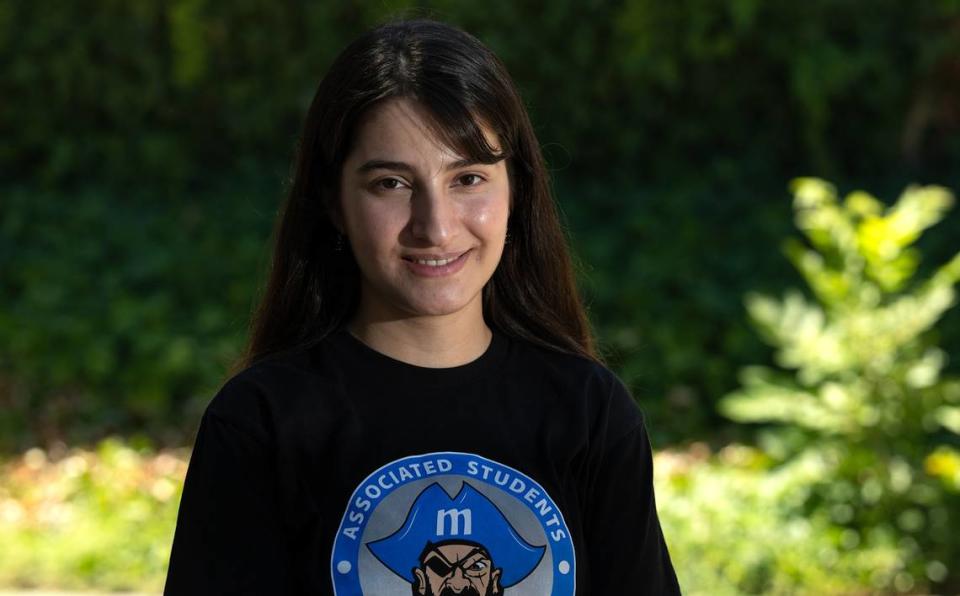For Afghan women at MJC, studies are a world apart from homeland. How new cohort helps
For female students in Afghanistan, education is separate and unequal. Classes are segregated by gender, and in some parts of the country, girls are prohibited from continuing school past sixth grade.
Even in cosmopolitan cities like Kabul, where girls might have access to a high school education, they suffer from subpar teachers and have fewer resources. Under the Taliban, the few rights women have are increasingly at risk.
Laila, 26, and Ghazal Noorani, 24, spent most of their education in a female-only classroom before they moved from Kabul to Modesto last year as refugees.
“We didn’t have a co-education system,” says Laila Noorani. She is wearing a blouse and pants and speaks confidently, even when she occasionally asks her brother Basir to translate on her behalf. Laila explains that many Afghan women at Modesto Junior College feel uncomfortable or unprepared at first because teachers have the same standards for both the male and female students.
This spring, the two sisters enrolled at MJC to learn English, but the cultural barriers to education were as daunting as the classes themselves. Now, they want to help students like them. When the fall semester starts Aug. 29, Laila and Ghazal Noorani will be part of an inaugural cohort for a new program aimed to support Afghan women at MJC.
The potential reach of the program is impressive. According to the Research Office at MJC, roughly 30% of the English-language learning students, about 350 people, are Afghan, and the majority are women.
The program is called Hambastagizanan, the same word used for similar female support networks in Afghanistan. Longtime MJC English professor Ruth Luman came up with the idea for Hambastagizanan after noticing some of the special needs of Afghan women in her classroom.
Program modeled after other supports at MJC
Luman used feedback from students and modeled the program on other support networks at MJC, like the association for formerly incarcerated students, or La Comunidad, which provides resources for Latino students.
“I’m teaching English, but I’m teaching people,” says Luman. “It’s not just about teaching your stuff and closing the door and leaving.”
Hambastagizanan will offer Afghan women a space to support one another inside and outside the classroom. That could include helping a student access child care or transportation. In other cases, Hambastagizanan might offer a space where Afghan women can receive mentorship in their native language or ask questions they may not feel comfortable asking in English. The program officially begins at the start of the school year, and interested women can contact Luman.
The program already has recruited a small number of leaders, including the Noorani sisters, to serve as ambassadors and mentors. While the two women are new to Modesto, they aren’t shy about speaking up and stepping out in their community. Laila was a radio journalist in Kabul, while Ghazal worked on an education broadcasting channel that focused on women’s issues.
When the U.S. withdrew from Afghanistan and the Taliban took over, their work put them at risk of persecution. The Committee for the Protection of Journalists helped the sisters and their mother travel to the U.S., where Basir already was living. The women are now applying for asylum.
For six months, they lived in the Comfort Suites hotel in Turlock as the local refugee resettlement agency struggled to manage the flow of new arrivals from Afghanistan. Basir traveled from Turlock to Modesto first and tested out the MJC classes before encouraging his sisters to join.
Like the Noorani sisters, Shabnam Mujaddidi, 22, will be another leader in the Hambastagizanan program this fall. She’s sporting an MJC T-shirt and keeps her phone on hand, blending her in with the other students. Though she speaks in near-fluent English and has lived in the U.S. for two and half years, her mother and older siblings are still in Kabul.

Without Mujaddidi, Luman thinks the Hambastagizanan program wouldn’t be happening. “She’s the leader of the leaders,” the professor says.
Mujaddidi won’t be around for long, though. She graduates this spring and hopes to transfer to UC Davis to pursue a bachelor’s degree in business administration.
It’s a fine balance between Mujaddidi’s own aspirations and those of her community. But in the short term, she is still dreaming big. “We want to work beyond the college as well, in society, and help Afghan women out, overcoming any kind of challenges or barriers they’re facing.”


